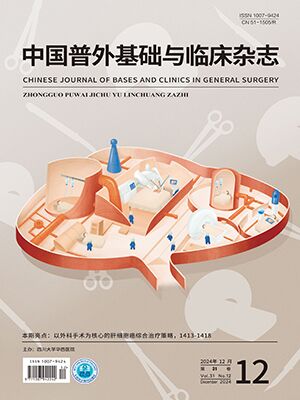Objective To study whether carbon dioxide used to establish pneumoperitoneum has an influence on port-site and intraperitoneal implantation and metastasis of tumor cells.
Methods R15 hepatic cancer cells were injected into 30 Wistar rats’ peritoneal cavities 1 hour before operation, then the 30 Wistar rats were randomly divided into 3 groups: gasless group, helium group and carbon dioxide group. The suspension was exposed to the gas environment for 2 hours, all animals were killed after 28 days and the port-site and intraperitoneal implantation and metastasis of tumor cells were examined.
Results On port-site, intestinal serous coat, mesentery, greater omentum and diaphragm, the weights of tumor cells, in carbon dioxide group were (326.7±230.3) mg, (626.2±215.9) mg,(476.2±204.8) mg,(2 536.5±906.7) mg and (384.5±149.9) mg respectively; in helium group were (235.6±107.3) mg, (414.2±148.4) mg, (261.8±92.6) mg, (1 633.4±247.3) mg and(220.0±57.9) mg; in gasless group were (145.0±42.4) mg, (221.5±108.2) mg, (212.5±109.6) mg, (797.5±335.9) mg and 113.0 mg.The weights of carbon dioxide group showed a significant increase, compared with helium group and gasless group (P<0.05). The weights of helium group were greater than gasless group,but there was no significance in statistics (P gt;0.05).
Conclusion The insufflation of carbon dioxide promotes intraperitoneal tumor implantation and growth compared with helium and gaslessness in a rat model.
Citation: WANG Guangyi,MENG Xianying,GU Jianhua,Lv Guoyue. Effects of Pneumoperitoneum with Carbon Dioxide on Implantation and Growth of Tumor Cells. CHINESE JOURNAL OF BASES AND CLINICS IN GENERAL SURGERY, 2004, 11(2): 133-135. doi: Copy
Copyright © the editorial department of CHINESE JOURNAL OF BASES AND CLINICS IN GENERAL SURGERY of West China Medical Publisher. All rights reserved




